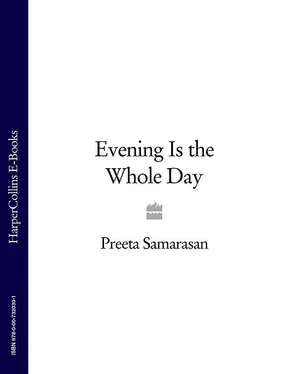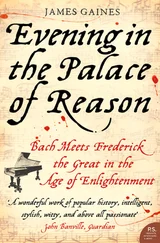Chellam is huffing and puffing once again, dragging her suitcase through the house’s endless, haphazard corridors. “Eh! What is this?” Amma whispers, low, urgent, her eyes darting around the room as if the confirmation of her suspicions might lie behind a painting or inside an urn. “Why she took so long to come down the stairs? Halfway down she must’ve gone back up, you see! And what was she doing up there all this time? Very funny. Very strange.”
In the evening Amma will find two ringgit missing from the glass bowl in which she keeps change for the roti man and the newspaper man, and Chellam will be accused in her absence of one last crime, pettier perhaps than the one for which she has been expelled from the Big House, but more shameless given everything that has transpired. Insult to injury, salt to an open wound, another inch taken from the yard of mercy they’ve already given her. Accused she will remain, until one night Appa happens to mention that the Volvo has been looking quite nice since he gave Mat Din two ringgit from the glass bowl to polish and wax it. (In fact, Chellam went back upstairs in a mostly futile attempt to impose some order on a storeroom thrown into disarray by the hasty extrication of her suitcase from under a pile of old newspapers.)
In the distance, Chellam’s suitcase slides and grates on the marble floor, and Chellam herself wheezes and sniffs from the cold that never seems to leave her. Across the dining room she shambles, and into her room under the stairs, where her clothes lie in a heap on her unmade bed. From the walls Kamal Hassan, Jayasudha, Sridevi, and Rajnikanth eye her glossily: Chellam, Chellam, they chide her, all the months you gazed at us, at our forelocks and our nose-rings and our flared nostrils, while trying to fall asleep, and today you ignore us like this? But Chellam’s mind is elsewhere this morning, and besides, squatting over her suitcase, she’s much too far away from their film-star faces to see anything more than the blur of their uniformly wheatish complexions. The suitcase lid swooshes as she drops it and then presses down on it to retie the raffia. She turns the suitcase around and around, pulling the raffia so hard the fibers leave red welts on her palms. She drags the suitcase the few remaining yards to the front door, rubbing her nose with an index finger.
“Chhi!” Amma says, the syllable exploding directly into her mug of tea. “Can’t even be bothered to find a tissue! If she’d listened to your Appa and started packing nicely one month ago she wouldn’t be in such a mess now, all kacan-mucan running here running there and sniffing and gasping all over the place, isn’t it?”
The sniffing, the wheezing, the scraping, and the grating grow fainter and fainter.
Good riddance to bad rubbish , Paati mouths behind the curtain. Aasha manages to read her lips through the fabric, thanks only to a superhuman feat of concentration.
Through the window on the other side of the dining room, Chellam finally appears in the garden. Aasha and Suresh can see her, but Amma can’t. Her determined suitcase-dragging has worked the zipper on her skirt slowly around to her left hip. Her collar has twisted itself to one side, and a button has come undone at her waist. An inch of her stomach shows through the gap, creamy brown, lighter than the rest of her, perhaps pregnant, perhaps not. Unaware she’s being watched, she leans her suitcase against the ornamental swing and tugs at her waistband to bring the zipper round to the back again. She buttons the undone button, straightens her collar, and smoothes her frizzy hair. Then, with great difficulty, she drags her suitcase out to the gate, picking it up and kicking it weakly every time a bit of gravel gets caught in its wheels.
“Shall we go, Appa?” she says to her father in Tamil. She doesn’t look at Aasha and Suresh’s Appa.
He doesn’t look at her, either. With his long tongue he worries a desiccated coconut fiber that’s been stuck between his molars since lunch. He looks at the ground and scratches his left ankle with the toe of his right slipper, still holding his umbrella perfectly erect.
Chellam’s father delivers a quick, blunt blow to the side of her head. “Taking ten years to come with her suitcase,” he grunts to Appa. “God knows what she was doing inside there for so long. Bloody useless daughter I have, lawyer saar,” he continues, revving up his engine, “you alone know how much shame she has brought upon me, you alone know what a burden a daughter like this can be.” He looks from his daughter to Appa and from Appa to his daughter. He hawks and spits into the monsoon drain, and his spittle runs red with betel juice, staining the sides of the culvert as it dribbles. “How, lawyer saar, how will you forgive —”
“That all you don’t worry,” says Appa. “Forgiving-shorgiving all you don’t worry, Muniandy. Just take your daughter and go. Go away and leave us alone.”
“Okay, enough of it,” says Amma inside the house. “What for all this drama now? Are they waiting for the violin music or what? Why won’t he buzz off?”
The latch on the gate clicks shut and Chellam and her father are gone, she pulling the suitcase, her sozzled father swaying behind her. Till the end of her numbered days the green of the weedy verges she passes on her ignominious retreat will be stamped on the insides of Chellam’s eyelids; she will hear the neighbors’ whispers in her ears on quiet mornings; whenever it rains she will smell the wet clay and feel her feet sink with each step and her shoulder ache from the weight of her broken suitcase.
Appa stands with one foot on the lowest rung of the gate, watching them as they go. All down the street faces hang behind window curtains like dim bulbs.
“Sure enough,” Mrs. Malhotra from across the street mutters to herself, “they’re sending the girl home. These days you simply cannot trust servants.” She turns from the window and looks at her old father, who sits rocking in his chair and humming urgently like a small child needing to pee. “Arre, Bapuji!” she cries. “You lucky-lucky only that we haven’t dumped you into a servant’s lap, yah, otherwise you’ll also be dead and gone by now!”
The Wongs’ retarded son, Baldy, points at them as they pass the house next door, where Amma’s parents used to live until they died three years ago. Baldy crows through the branches of the mango tree in which he’s perched in the rain, but nobody pays him any attention. His father’s at work. His mother’s peeling shallots in the kitchen. The neighbors are all used to him.
“Don’t say retarded ,” Amma had scolded the first time Appa had used the word to describe Baldy. “He’s just a bit slow, that’s all.”
“To retard is to slow,” Appa had said. “Ecce signum: the inestimable OED .” He’d pulled the dictionary off the bookshelf in the sitting room and laid its dusty black cardboard cover on Amma’s breakfast plate.
“Okay, enough of it,” Amma’d said then, and pushed her chair back so vehemently to leave the table that her tea sloshed onto her saucer. But Uma and Appa had shared a triumphant, twinkling grin, and even Suresh and Aasha had got the joke.
No curtains are stirring at the Manickams’ window three doors down: the former Mrs. Manickam is lying in bed in Kampong Kepayang eating peeled and pitted longans from the hand of her new husband, who leaves the office early every day for this very purpose, and Mr. Manickam is at the office though it’s a Saturday, burying his sorrows in work as usual.
“Looklooklook,” says Mrs. Balakrishnan farther down the street, flicking her husband’s sleeve as he sits reading the newspaper. “Sure enough man, they’ve sent the girl off from the Big House. What for all this drama now? Now only they’ll sit and cry. As if it will bring the old lady back. When she was sitting in her corner the whole time they were complaining only. Cannot manage her it seems. Must get another servant it seems. Too grand to look after her themselves. That’s what too much money will get you in the end. Just troubles and tears.”
Читать дальше












